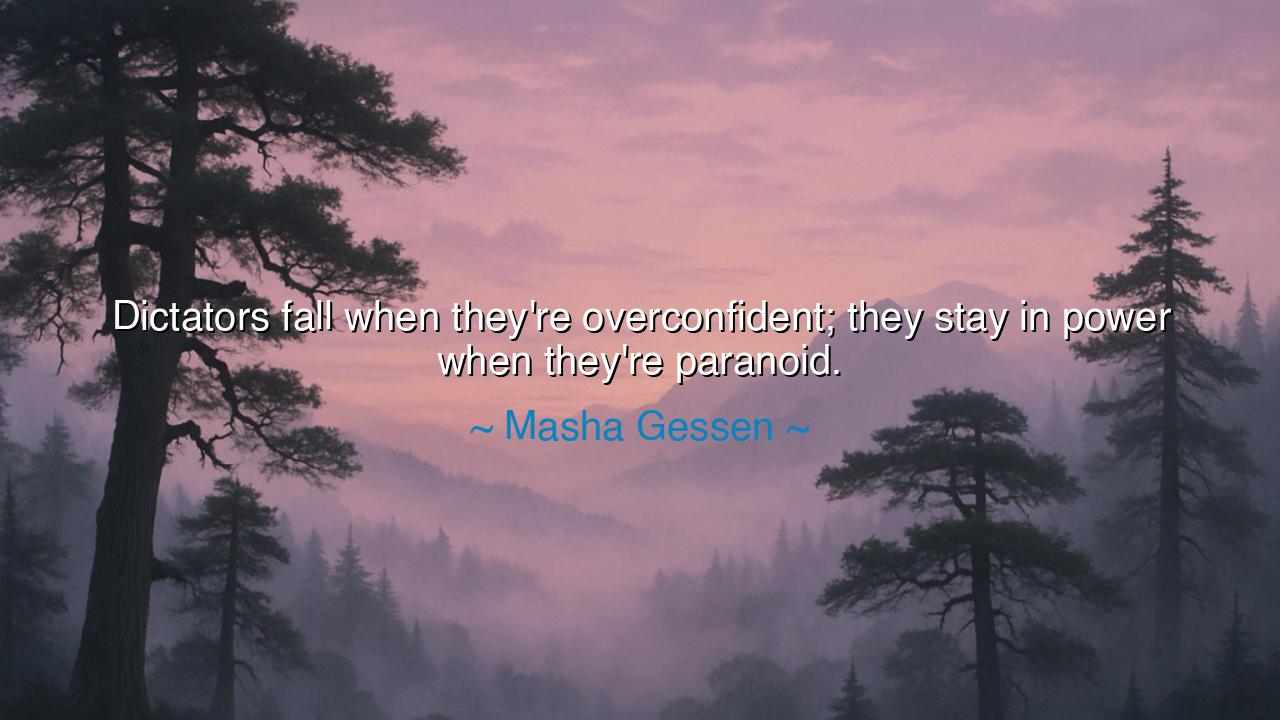
Dictators fall when they're overconfident; they stay in power






The sharp chronicler of tyranny, Masha Gessen, once declared: “Dictators fall when they're overconfident; they stay in power when they're paranoid.” In this saying lies the anatomy of power unrestrained, and the frailty of those who cling to it. For the tyrant who grows proud, blind to threats and deaf to warning, is soon overthrown; yet the tyrant who lives in constant paranoia, forever fearing enemies, plotting against shadows, builds fortresses of cruelty that preserve his reign. Thus the seed of his rise and the measure of his fall lie not in strength alone, but in his state of mind.
The origin of this wisdom comes from centuries of blood and betrayal. Gessen, a student of authoritarian rule, looked upon Russia and beyond, tracing the patterns of those who grasped at power. She saw that when the dictator becomes swollen with overconfidence, imagining himself unassailable, he loosens his grip and invites revolt. But when he sinks into suspicion, purging allies, silencing foes, and tightening his grasp, he creates a reign that endures through fear. This is the paradox of tyranny: it survives not by love or trust, but by perpetual fear.
History itself offers proof. Adolf Hitler, drunk with overconfidence, invaded Russia against all counsel, believing himself destined for victory. His hubris destroyed him, and his empire of blood collapsed. Yet Joseph Stalin, ever paranoid, saw enemies everywhere—real or imagined—and through purges and terror extended his rule for decades. The one perished by his pride; the other endured by his fear. Gessen’s words echo in their stories like a solemn drumbeat across the ages.
The ancients too saw this truth. The Greeks warned of hubris, that fatal arrogance of kings which summoned Nemesis, the goddess of retribution. Xerxes, overconfident in his countless hosts, hurled them at Greece only to be humbled at Salamis. Yet lesser tyrants, gnawed by paranoia, lasted longer, for they strangled dissent before it could be born. Thus even in antiquity, men knew: it is not armies alone that guard a throne, but the restless vigilance of the tyrant’s mind.
Therefore, O seekers, learn from this: beware the temptation of overconfidence, for it blinds even the mighty; yet do not envy the tyrant’s paranoia, for though it lengthens his reign, it poisons his soul. The true ruler needs neither pride nor fear, but balance, humility, and justice. For kingdoms built on suspicion may endure, but they endure as prisons, not as havens. Let this be your wisdom: the fate of the dictator is written not only in his deeds, but in the shadows of his heart.






L827.Vuong Mai Phuong lop 8A5
This perspective prompts me to reflect on the broader implications for governance and public awareness. If paranoia prolongs authoritarian rule, how can citizens, opposition movements, and international actors strategically respond? Is there a point where paranoia itself becomes self-destructive, leading to isolation and mistrust within the leadership? I’m also intrigued by how overconfidence and paranoia might appear in non-political contexts, like corporations or institutions, affecting their stability and decision-making.
MDMinh Do
Reading this, I’m curious about the balance between fear and hubris in leadership. Could a paranoid dictator be less likely to make reckless decisions, and does that inadvertently stabilize their regime? On the other hand, does overconfidence always invite collapse, or are other factors like popular support, military loyalty, or external alliances equally important? I’d like to explore how these traits have shaped historical dictatorships and what lessons modern governments might draw.
HVNguyen Thi Hoang Vy
I find this quote both insightful and unsettling. It raises the question of whether a dictator’s survival is more about mindset than policy. Does paranoia lead to tighter control and constant vigilance, thus preventing threats to power, while overconfidence blinds them to dangers? How might this understanding help societies anticipate the rise or fall of authoritarian leaders, and are there ways to mitigate the risks before paranoia becomes destructive?
QMNguyen Quang Minh
This statement makes me think deeply about the psychology of authoritarianism. How does paranoia contribute to a dictator’s longevity, and can excessive caution sometimes prevent the very overreach that leads to downfall? Conversely, are there historical cases where overconfidence did not result in collapse, or is this a near-universal pattern? I also wonder how this dynamic interacts with external pressures like economic crises, military challenges, or international intervention.